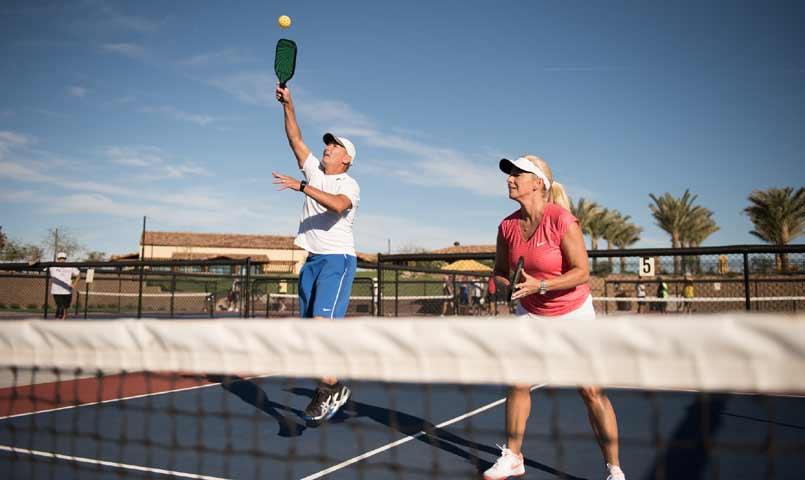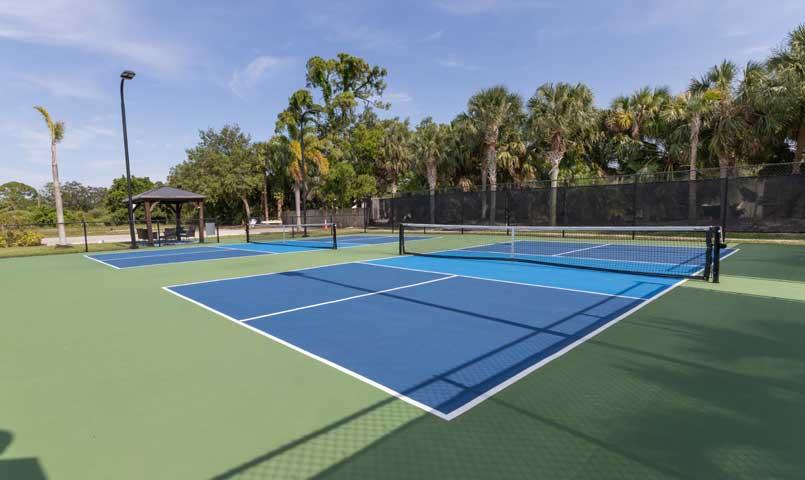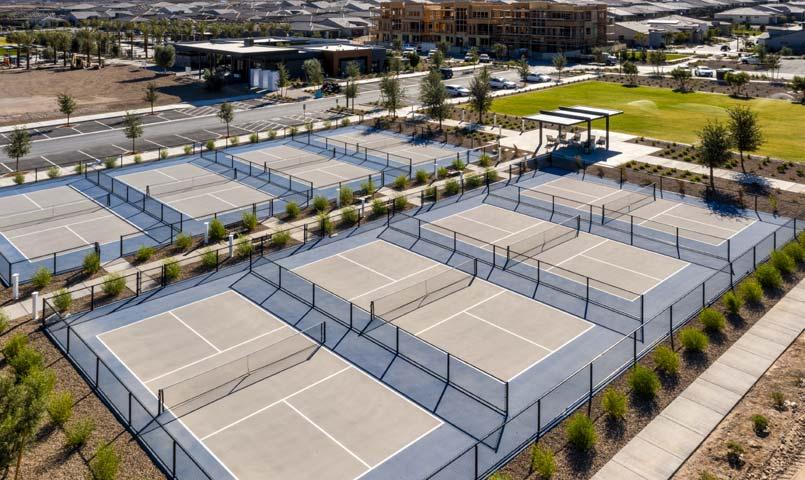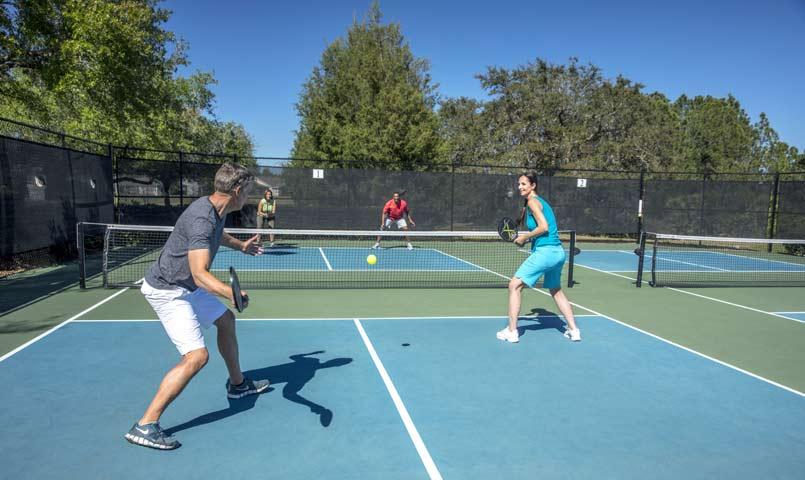by Robert Borges on October 14, 2025
What Is Pickleball and Why Do Seniors Love It?
Pickleball combines tennis, badminton, and ping-pong into one easy-to-learn paddle sport. Played on a smaller court with a lightweight ball, it offers the perfect balance of exercise, strategy, and social interaction. For adults 55 and over, pickleball is both physically manageable and mentally stimulating—making it one of the most popular activities in active adult and retirement communities today.
Pickleball’s Popularity and Growth
Pickleball originated in 1965 in the backyard of Washington State Congressman Joel Pritchard. Over the next 45 years the sport spread slowly throughout the U.S. Once a backyard pastime, pickleball has evolved into America’s fastest-growing sport—especially among older adults.
- Nearly 20 million Americans now play pickleball, up almost 46% since 2023.
- There are more than 68,000 courts nationwide, with thousands more being added every year.
- Roughly 6.2 million “core players” play eight or more times per year.
- While participation among younger age groups is increasing, older adults (ages 55 and up) still make up one of the most dedicated segments of players.
Pickleball’s rise is driven by its accessibility, affordability, and community appeal—especially among retirees who want to stay active without overexerting themselves.
Why is Pickleball Good for Seniors?

Physical Health Benefits
- Low-impact cardio: Provides an effective cardiovascular workout with minimal stress on joints and muscles.
- Improved strength and balance: Enhances flexibility, coordination, and core stability—crucial for fall prevention.
- Joint-friendly exercise: The lightweight paddle and slow-moving ball make it easier on knees, hips, and shoulders than sports like tennis or running.
- Supports chronic condition management: Regular play can help reduce risks associated with heart disease, diabetes, and high blood pressure.
Mental and Emotional Benefits
- Cognitive engagement: Quick reflexes and strategy sharpen focus and decision-making.
- Social connection: Pickleball is a social sport that helps combat isolation and fosters lasting friendships.
- Mood boost: The combination of fun, physical activity, and camaraderie naturally reduces stress and lifts spirits.
Pickleball Tips for Seniors
Whether you’re new to the game or returning after years away from racquet sports, these tips can help ensure a safe and enjoyable experience:
- Start gradually: Play once or twice a week to build endurance and avoid overuse injuries.
- Warm up and cool down: Focus on stretching your shoulders, hips, and calves before and after playing.
- Choose the right gear:
- Lightweight paddle with large sweet spot and shock absorption
- Supportive court shoes with good grip and cushioning
- Comfortable, breathable clothing
- Optional: protective eyewear and sun protection
- Learn proper technique: Good footwork and positioning matter more than power.
- Play doubles: Reduces court coverage and helps minimize physical strain.
- Stay hydrated and rest: Especially important in hot climates.
- Consult your doctor: If you have pre-existing health concerns, get a green light before playing regularly.
Staying Safe on the Court

While pickleball is generally safe for older adults, keep these precautions in mind:
- Avoid overexertion—pace yourself, especially if you’re new to the sport.
- Be cautious of slippery or uneven court surfaces.
- Choose footwear with proper lateral support.
- Stretch regularly to maintain mobility.
- Take breaks and listen to your body to prevent fatigue or falls.
Top 55+ Communities with Pickleball for Seniors
Pickleball has quickly become a must-have amenity in 55+ and active adult communities. Across the country, developers are adding high-quality courts, professional instructors, and organized play to attract residents looking for social and fitness-friendly lifestyles.
With 30 years of experience, Private Communities Registry (PCR) connects homebuyers with lifestyle, master-planned, and 55+ communities across the U.S.—many featuring top-tier pickleball facilities. PCR currently showcases nearly 200 communities where residents can enjoy pickleball courts, leagues, and tournaments.
Featured Pickleball Community for Seniors: Cresswind Georgia at Twin Lakes
Developed by Kolter Homes, Cresswind Georgia at Twin Lakes in Hoschton, GA, is home to one of the largest private pickleball complexes in the Southeast—featuring over 30 courts, a viewing pavilion, and tournament-quality amenities. It’s a shining example of how pickleball has become an integral part of today’s active adult lifestyle.
Other standout active adult pickleball communities include:
- Brunswick Forest – Leland, NC
This coastal Carolina community near Wilmington features multiple lighted courts, organized play groups, and a vibrant social calendar built around pickleball and fitness. - Solivita – Kissimmee, FL
One of Florida’s premier active adult communities, Solivita offers 17 dedicated pickleball courts, plus tournaments, lessons, and active pickleball clubs for all skill levels. - Del Webb at Rancho Mirage – Rancho Mirage, CA
Minutes from Palm Springs in the scenic Coachella Valley, the community pickleball courts keep the friendly competition going year-round. - Encore at Eastmark – Mesa, AZ
This Arizona 55+ community 30 minutes from Phoenix offers an exclusive age-restricted neighborhood with pickleball courts for seniors.
Frequently Asked Questions (FAQ)
Q: Why is pickleball especially good for seniors?
A: It provides full-body exercise without putting stress on joints, promotes socialization, and is easy to learn for all fitness levels.
Q: Is pickleball safe for seniors with arthritis or joint issues?
A: Yes—its low-impact nature makes it safer than high-intensity sports. Use a lightweight paddle and good shoes to minimize strain.
Q: How often should seniors play pickleball?
A: Start with 1–2 sessions per week for 30–60 minutes, then increase gradually as your stamina improves.
Q: What equipment do seniors need for pickleball?
A: A lightweight paddle, comfortable shoes, breathable clothing, balls, and optionally, wrist or knee supports.
Q: How much does it cost to play pickleball?
A: Starter paddles cost around $30–$60. Many parks offer free courts, while community amenities are often included in HOA fees.
Q: Where can I find 55+ communities with pickleball courts?
A: Visit PrivateCommunities.com to explore hundreds of active adult and retirement communities across the U.S. featuring dedicated pickleball facilities.
The Future of Pickleball for Seniors
Pickleball’s explosive growth shows no sign of slowing. As more 55+ homebuyers seek wellness-focused, social lifestyles, developers are responding with state-of-the-art pickleball amenities.
Expect to see:
- Larger community pickleball complexes with indoor and outdoor courts
- Organized leagues, clinics, and tournaments for all skill levels
- More inclusive design for accessibility and senior comfort
- Community events centered around pickleball as a social hub
In short, pickleball has moved from trend to lifestyle—anchoring many of the most desirable retirement and active adult communities in America.
PCR: Your Resource for Pickleball Communities

For more than three decades, Private Communities Registry (PCR) has helped connect homebuyers with the best lifestyle and master-planned communities across the country. Whether you’re searching for a 55+ neighborhood with world-class pickleball courts or a resort-style community where fitness meets fun, PCR provides trusted insights, expert guidance, and direct access to developers and communities that match your lifestyle goals.
About the Author
With over 20 years of experience as a seasoned content creator, Robert Borges is the senior writer for Private Communities Registry (PCR), specializing in real estate trends and master-planned communities. He works closely with builders, developers, and real estate pros to create helpful content that guides homebuyers in finding the perfect community, ensuring they have the information needed to make confident, informed decisions.

